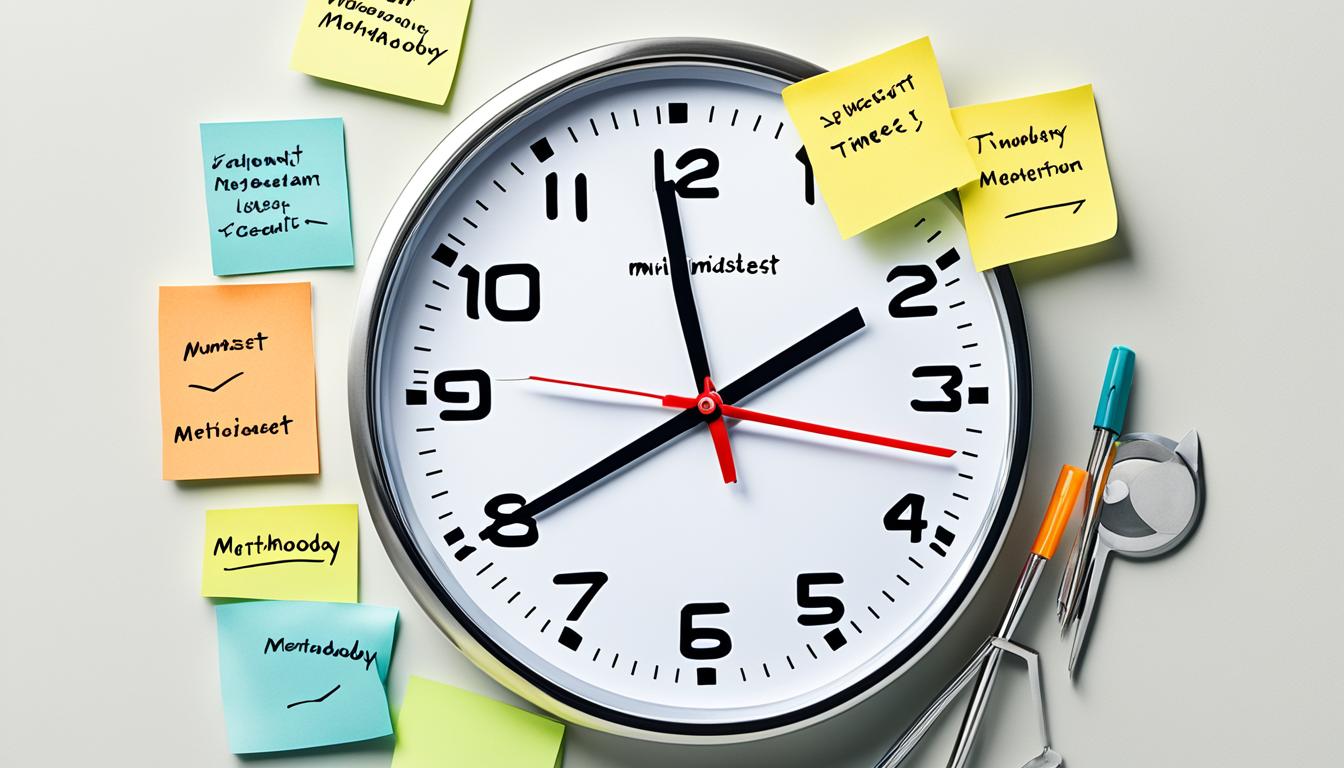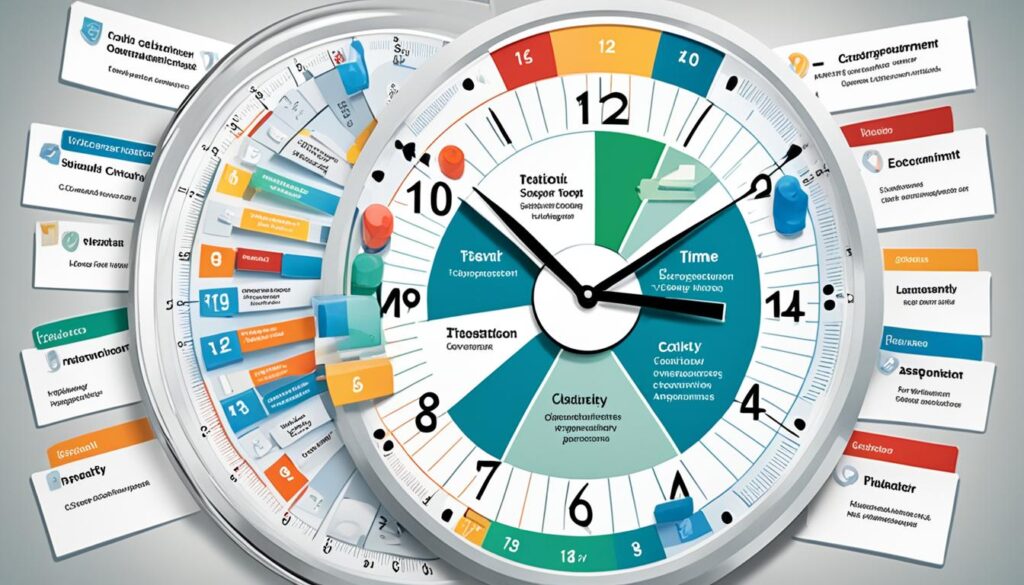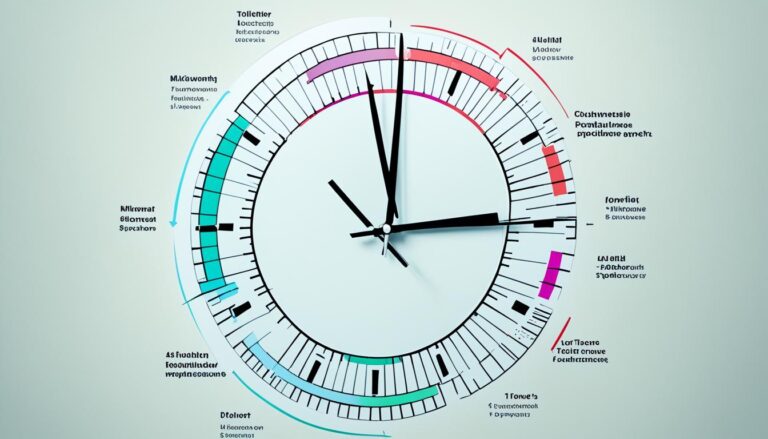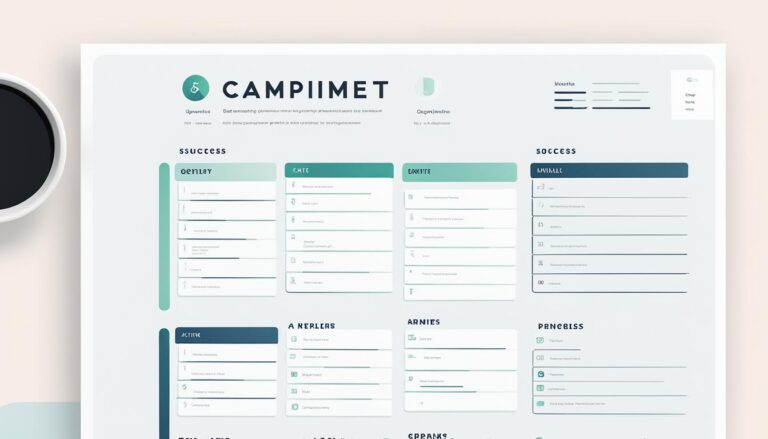Master Life with M3 Time Management Strategies

“The bad news is time flies. The good news is you’re the pilot.” – Michael Altshuler
Welcome to the world of M3 time management strategies, where you hold the power to unlock your full potential and transform mere hours into remarkable achievements. In this fast-paced and demanding world, effective time management is the key to success, not just in medical school but in all aspects of life. It’s about making every moment count, optimizing your productivity, and finding a harmonious balance among your academic, personal, and professional responsibilities.
With the right time management tools and techniques, you can confront the challenge head-on and soar above the chaos. It’s time to take control of your time and create a life that aligns with your values, interests, and ambitions.
Key Takeaways:
- M3 time management strategies empower you to maximize your productivity and achieve your goals.
- Effective time management reduces stress and enables you to maintain a healthy work-life balance.
- Prioritize your values, interests, and skills to make informed decisions and manage your time more effectively.
- Seek guidance from mentors and utilize resources to research desirable qualifications for different specialties.
- Develop a comprehensive curriculum vitae (CV) and stay organized with important deadlines for residency programs.
M3 Year Resources for Planning Your Specialty
The M3 year is a critical time in your medical education journey. It’s a period when you need to carefully plan and make important decisions about your future specialty. To assist you in this process, there are several valuable resources available that can provide guidance and support. Here’s a comprehensive list of M3 year resources to help you plan your specialty:
- M3 Career Advisor: Schedule a meeting with your M3 career advisor to discuss your options and strategize your specialty choice. They can provide valuable insights and help you navigate the decision-making process.
- COMLEX Level 1: Take the COMLEX Level 1 exam by September 30 of your M3 year. Consider your board scores when making decisions about your specialty.
- Residency Preference Exercise (RPE): Use the Careers in Medicine site to complete the RPE. This exercise allows you to assess your competitiveness and explore your preferred residency programs.
- Careers in Medicine Competitiveness Tab: Research desirable qualifications and competitiveness for different specialties using the competitiveness tab on the Careers in Medicine site.
- Curriculum Vitae (CV): Prepare a comprehensive CV that includes information from your first year through the third year. Your CV will be essential when applying to residency programs.
- Personal Statement Feedback: Provide your CV to your letter of recommendation writers and seek feedback on your personal statement. Their insights can help you refine your application materials.
- COM Residency Fair: Attend the COM Residency Fair to explore residency positions and programs. This event is a great opportunity to gather information and make connections.
- COMLEX Level 2 CE: Determine the best timeframe to take the COMLEX Level 2 CE and select your test dates. Ensuring your exam is completed on time is crucial for the residency application process.
- Residency Program Applications: Begin applying to residency programs and pay close attention to deadlines. Stay organized and track the specific requirements of each program.
- ERAS Residency Fair: Consider attending the ERAS Residency Fair, where you can learn more about different programs and gain valuable insights.
- Away Rotations: If applicable to your specialty, schedule away rotations. These rotations can provide you with unique learning experiences and help you make informed decisions about your future career path.
Remember that throughout this process, it’s essential to stay organized, seek guidance from mentors and advisors, and utilize the available resources effectively. To further understand the significance of this planning phase, take a look at the table below, which highlights the key aspects of the M3 year resources for planning your specialty:
| Resource | Importance |
|---|---|
| M3 Career Advisor | Guidance and support in specialty choice |
| COMLEX Level 1 | Consider board scores for specialty decisions |
| Residency Preference Exercise (RPE) | Assess competitiveness and explore preferred programs |
| Careers in Medicine Competitiveness Tab | Research qualifications and competitiveness for specialties |
| Curriculum Vitae (CV) | Document your experiences for residency applications |
| Personal Statement Feedback | Refine your personal statement with expert input |
| COM Residency Fair | Explore residency positions and programs |
| COMLEX Level 2 CE | Complete this critical exam on time |
| Residency Program Applications | Apply with attention to specific deadlines |
| ERAS Residency Fair | Gather insights and learn about different programs |
| Away Rotations | Gain valuable experiences and make informed decisions |
By utilizing these resources and taking advantage of the opportunities available to you, you can effectively plan your specialty and set yourself up for success in your medical career.

M3 Clinical Rotations and Key Considerations
During your M3 clinical rotations, you have a valuable opportunity to gain hands-on experience and shape your future medical career. It’s crucial to make the most of these rotations and consider important factors for your residency program search.
Here are some key considerations to keep in mind:
- Ask for feedback and set expectations: Approach each rotation with a proactive mindset. Take the initiative to ask your attending physician about their expectations and how you can improve your skills. Actively seek feedback to refine your clinical knowledge and bedside manner.
- Express interest in specific specialties: Use your clinical rotations as a platform to explore different specialties. Communicate your interest in specific residency programs and specialties to mentors, attending physicians, and senior residents. This will help you gain exposure and valuable insights into your desired field.
- Build meaningful relationships: Connect with senior residents and physicians who can serve as mentors throughout your medical journey. These experienced professionals can provide guidance, share their wisdom, and support you during the residency application process.
- Express gratitude: Sending thank you notes after each rotation is a simple yet impactful gesture. It shows your appreciation for the time and knowledge shared by the attending physician and the entire healthcare team.
- Pass the COMLEX Level 2 CE: To strengthen your residency program applications, it’s important to take and pass the COMLEX Level 2 CE. Many programs require this exam for interviews and ranking decisions. Make sure you plan accordingly and allocate sufficient time for preparation.
- Stay informed and engaged: Attend events like Come Home Day and other residency program activities to stay connected with the latest updates and insights. These events provide opportunities to network with program directors, residents, and fellow medical students.
- Register with ERAS and upload documents: As you progress through your M3 year, register with the Electronic Residency Application Service (ERAS) and start uploading essential documents. These include your profile picture, comprehensive curriculum vitae (CV), and a powerful personal statement that highlights your unique qualities and motivations.
- Apply to residency programs: With the guidance of your mentors, advisors, and peers, start applying to residency programs that align with your goals and aspirations. Stay organized and keep track of application deadlines and specific requirements for each program. Consider attending presentations on applying for away rotations if you’re interested in exploring opportunities beyond your home institution.
By actively engaging in your M3 clinical rotations and considering these key factors, you can make informed decisions and navigate the residency program search with confidence. Remember to leverage the guidance and support available to you as you advance in your medical career.
Sample Timeline for M3 Clinical Rotations and Residency Program Search
This sample timeline provides an overview of key milestones during your M3 year:
| Month | Activity |
|---|---|
| June | Begin M3 clinical rotations |
| August | Take the COMLEX Level 2 CE |
| September | Attend Come Home Day and other residency program activities |
| October | Register with ERAS and start uploading documents |
| November | Begin applying to residency programs |
| December | Consider scheduling away rotations if desired |
| February | Participate in residency program interviews |
| March | Rank residency programs through the matching process |
| May | Match Day: Find out your residency program placement |
Keep in mind that this is just a sample timeline, and it’s essential to tailor it according to your specific program requirements and personal goals.

The M3 Year and Transitioning to Residency
The M3 year is a crucial period in your medical education as you make the transition from medical school to residency. This year plays a significant role in shaping your future career and success as a healthcare professional. As you navigate through this phase, it’s important to be well-prepared and informed about the residency match process and the requirements set forth by the National Resident Matching Program (NRMP).
To begin your journey towards residency, familiarize yourself with the match process and understand the intricacies involved. The NRMP outlines the guidelines and deadlines for matching into residency programs, and being well-informed can give you an edge in this competitive process.
Once you have a clear understanding of the match process, it’s time to explore residency programs that align with your interests and goals. Use resources such as the ACGME FREIDA & AMA Residency Database to research and identify programs that resonate with your career aspirations. Take note of program requirements, location, and specialties offered to narrow down your options.
As you continue your M3 year, consider attending presentations or workshops on applying for away rotations. These rotations offer valuable experiences and insights into your desired specialty, providing an opportunity to broaden your knowledge and network with professionals in the field. If necessary, schedule and plan these rotations accordingly to enhance your chances of matching with your desired program.
Building a strong support network is crucial during this phase. Seek guidance from advisors, faculty, and mentors who can provide valuable insights and advice as you navigate through the residency application process. Their expertise and experience can prove invaluable in making informed decisions and preparing a competitive application.
To ensure a smooth transition, it’s essential to complete your clinical rotations and take the necessary exams, such as the COMLEX Level 2 CE. These exams play a crucial role in assessing your knowledge and competency, and many residency programs consider them during the application review process.
One invaluable resource to aid you in your residency program search is the Careers in Medicine site. Utilize this platform to gather information, refine your CV, and draft a compelling personal statement that highlights your strengths and motivations. Additionally, ensure that your letters of recommendation are ready and that they accurately reflect your skills and capabilities.
Stay organized throughout the application process by keeping track of deadlines and requirements for each residency program you are applying to. Being diligent and proactive can help you stay ahead and submit your applications on time, increasing your chances of securing interviews and ultimately matching with the program of your choice.
Throughout your M3 year, it’s crucial to reflect on your personal and professional growth. Take the time to evaluate your experiences, challenges, and achievements, as they will shape your journey into residency. Embrace the opportunities and challenges that lie ahead, and prepare yourself both mentally and emotionally for the demands of residency.

Adjacent table shows important steps during the M3 year and residency transition:
| Steps | Description |
|---|---|
| Familiarize yourself with the residency match process | Understand the guidelines and deadlines set by NRMP |
| Research residency programs | Utilize resources like ACGME FREIDA & AMA Residency Database |
| Attend presentations on applying for away rotations | Plan and schedule rotations to gain valuable experience |
| Seek guidance from advisors, faculty, and mentors | Build a support network to navigate through the application process |
| Complete clinical rotations | Gain hands-on experience and demonstrate your skills |
| Take necessary exams | COMLEX Level 2 CE and other required assessments |
| Utilize Careers in Medicine site | Refine your CV, draft a compelling personal statement, and gather required documents |
| Stay organized | Track application deadlines and requirements for each program |
| Reflect on personal and professional growth | Evaluate experiences and prepare for the challenges of residency |
Conclusion
Effective time management is crucial in maximizing your productivity and achieving success in medical school and beyond. By implementing the M3 time management system and utilizing the strategies and tips mentioned throughout this article, you can improve your efficiency and make the most of your time.
Prioritize your values, interests, and skills when making important decisions about your specialty and residency program. Use the available resources and seek guidance from mentors and advisors. Stay organized, set goals, and manage your time effectively to balance your academic, personal, and professional responsibilities.
By mastering time management principles and strategies, you can optimize your productivity, reduce stress, and achieve your goals. Embrace the M3 time management system and unlock your full potential in your medical career.






